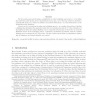Free Online Productivity Tools
i2Speak
i2Symbol
i2OCR
iTex2Img
iWeb2Print
iWeb2Shot
i2Type
iPdf2Split
iPdf2Merge
i2Bopomofo
i2Arabic
i2Style
i2Image
i2PDF
iLatex2Rtf
Sci2ools
121
click to vote
CATS
2007
2007
Constructing Optimal Highways
For two points p and q in the plane, a straight line h, called a highway, and a real v > 1, we define the travel time (also known as the city distance) from p and q to be the time needed to traverse a quickest path from p to q, where the distance is measured with speed v on h and with speed 1 in the underlying metric elsewhere. Given a set S of n points in the plane and a highway speed v, we consider the problem of finding a highway that minimizes the maximum travel time over all pairs of points in S. If the orientation of the highway is fixed, the optimal highway can be computed in linear time, both for the L1- and the Euclidean metric as the underlying metric. If arbitrary orientations are allowed, then the optimal highway can be computed in O(n2 log n) time. We also consider the problem of computing an optimal pair of highways, one being horizontal, one vertical.
Related Content
| Added | 29 Oct 2010 |
| Updated | 29 Oct 2010 |
| Type | Conference |
| Year | 2007 |
| Where | CATS |
| Authors | Hee-Kap Ahn, Helmut Alt, Tetsuo Asano, Sang Won Bae, Peter Brass, Otfried Cheong, Christian Knauer, Hyeon-Suk Na, Chan-Su Shin, Alexander Wolff |
Comments (0)

